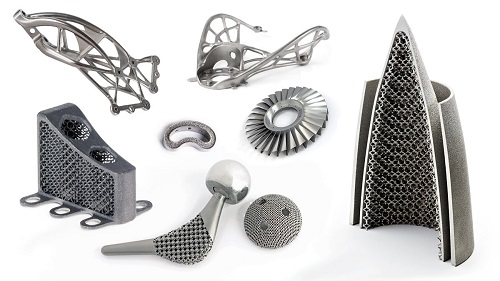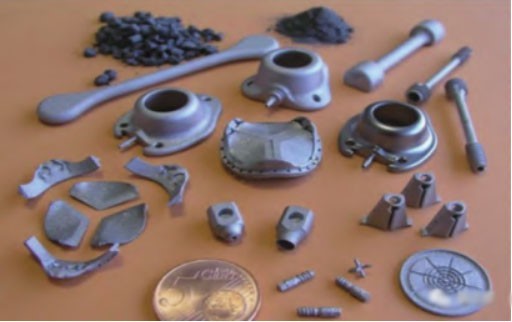



 CN/EN
CN/EN




 CN/EN
CN/EN
The field of 3D printing has seen significant advancements with the introduction of titanium alloys, which are known for their high strength and low density. This technology, also known as additive manufacturing (AM), has been recognized as a disruptive innovation in manufacturing, offering unique benefits such as design flexibility, reduced weight, and improved integration of components. The consumer electronics sector, perpetually seeking materials to boost both product performance and aesthetics, is now delving into the possibilities offered by titanium 3D printing

Application Status of Titanium Alloy 3D Printing Technology in the Consumer Electronics Industry
Ø Customized Components
The versatility of titanium alloy 3D printing allows for the creation of customized components tailored to specific consumer electronics, such as smartphones and tablets. This customization meets the diverse demands of consumers who seek unique and personalized devices. The recent breakthrough by the Institute of Metal Research, Chinese Academy of Sciences, demonstrates the potential of 3D printed titanium alloys to achieve near void-free structures, which could significantly enhance the fatigue resistance of these components.
Ø Innovative Design
Titanium 3D printing enables designers to push the boundaries of conventional design, creating lightweight and personalized consumer electronic products. The innovative Net-Additive Manufacturing Process (NAMP) developed by Chinese researchers has resulted in a near-Net-AM Ti-6Al-4V alloy with a remarkable increase in tensile fatigue strength from 475 MPa to 978 MPa, a 106% improvement. This level of strength is crucial for the design of portable, high-performance electronic devices that are resistant to fatigue.
Ø Rapid Prototyping
The ability to quickly produce prototypes is essential in the fast-paced consumer electronics market. Titanium 3D printing facilitates rapid prototyping, which not only reduces development costs but also accelerates the time to market. The advancements in 3D printing technology, as evidenced by the research from the Chinese Academy of Sciences, have made it possible to produce prototypes with high fatigue resistance, which is critical for the durability of consumer electronic products.

Prospects of Titanium Alloy 3D Printing Technology in the Consumer Electronics Industry
Ø Personalized Customization
As consumer electronics companies like Apple and Honor look to differentiate their products, personalized customization becomes increasingly important. The breakthrough in titanium 3D printing, which has resulted in materials with superior fatigue resistance, indicates a promising future for personalized consumer electronic devices. This technology allows for the production of components that are not only tailored to individual consumer preferences but also possess the structural integrity required for long-term use.
Ø Lightweight Design
The lightweight nature of titanium alloys is particularly advantageous for portable consumer electronic devices. With the advancements in 3D printing technology, such as the NAMP process, it is now possible to design and manufacture consumer electronics that are both lightweight and durable. The near-Net-AM Ti-6Al-4V alloy, which has shown a significant improvement in fatigue strength, is a prime example of how titanium 3D printing can contribute to the design of the next generation of portable electronic devices.
Insights From TCT Asia 2024
TCT Asia 2024 is shaping up to be an exciting event that will showcase the latest advancements and innovations in the 3D printing and additive manufacturing industry. It is scheduled to take place from May 7th to May 9th, 2024, at the National Exhibition and Convention Center (NECC) in Shanghai.
As we look forward to the TCT Asia 2024, it is anticipated that the event will serve as a pivotal platform for exploring the burgeoning applications of titanium 3D printing in the consumer electronics industry. With a focus on innovation and practical application, the exhibition will likely feature the latest advancements in titanium alloy 3D printing technologies that are shaping the future of consumer electronics.
Attendees can expect to see cutting-edge demonstrations of how titanium 3D printing is enabling the creation of customized components, facilitating innovative design, and streamlining rapid prototyping processes. The exhibition will also delve into the prospects of this technology, highlighting the potential for personalized customization and lightweight design that can enhance the performance and portability of electronic devices.
Conclusion
The integration of titanium 3D printing technology into the consumer electronics industry is a testament to the material's potential to revolutionize product design and manufacturing. The breakthroughs achieved by the Institute of Metal Research, Chinese Academy of Sciences, have not only enhanced the fatigue resistance of 3D-printed titanium alloys but also opened up new possibilities for innovation in the industry. As the technology continues to evolve, it is expected that titanium 3D printing will play an increasingly significant role in the consumer electronics sector, leading to the development of lighter, more durable, and personalized electronic devices.
The TCT 2024 event will undoubtedly be a platform for showcasing the latest trends and advancements in titanium 3D printing, providing valuable insights for industry professionals. We encourage you to visit the official TCT Asia website and follow our Facebook page for real-time updates, insightful discussions, and valuable networking opportunities.
Foot Notes
[1] Zhang, Z., Yang, R., Zhen, Q., Zhang, Z., & Robert O. Ritchie, et al. (2024). High fatigue resistance in a titanium alloy via near void-free 3D printing. Nature. https://doi.org/10.1038/s41586-024-07048-1
Join us at TCT Asia, connect with industry innovators as you explore the entire AM ecosystem including design, materials, hardware, software, post-processing, and quality. 10,000+ professionals will unite to hear about the latest trends, explore the latest immersive AM technologies and find solutions to their AM challenges. Make sure you are there too.

TCT ASIA 2024
Tuesday 7th May 09:00 - 17:30
Wednesday 8th May 09:00 - 17:30
Thursday 9th May 09:00 - 15:00
NECC(Shanghai)7.1&8.1H